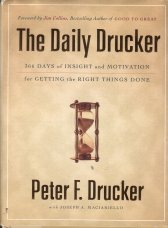« Television incapacitates | Main | Wave of dementia »
December 16, 2005
The Daily Drucker
 Dad has given me several books by Peter Drucker, described in the jacket of the The Daily Drucker as "the top management thinker alive today." (He was alive when the book was published.)
Dad has given me several books by Peter Drucker, described in the jacket of the The Daily Drucker as "the top management thinker alive today." (He was alive when the book was published.)
Peter Drucker certainly wrote and thought a lot about management, from the 1930s until the end of his life this year at age 95. He saw some trends apparently long before others, like the post WWII transition of the economy from being propelled primarily by physical industrial activity to being pushed ahead as well and perhaps primarily by what Drucker calls knowledge work.
Those who see themselves as managers would do well to read Drucker's work, but I doubt they should buy this particular book first. Each day's entry comes without its original context. Drucker can be tough to follow out of context, because his arguments build on observations and things he worked out in the past. These pieces may be forceful, but they're not parables. (In fact, it was the bookmark ribbon that made this book really hard to start. Even my NRSV Bible has no bookmark ribbon.)
Furthermore, the content is marred by the ACTION POINT summary suggestions on each page. Granted, the executive no doubt should do some of the activities suggested, but quite a few of them overinterpret what you just read, weakening the very Yancy-like effect Drucker is supposed to have on you. If you leave your thinking up to someone else to the extent proposed, you're a very dangerous manager indeed. Shut down your IM and your email, turn off your phone and your television, and give yourself time to think.
All that aside, The Daily Drucker provokes thinking. You cannot help but think when reading Drucker, which is why I missed the context. When he advances, as in the November 18 entry, "Like every other institution that coordinates human efforts to a social end, the corporation must be organized on hierarchical lines," enquiring minds want to know how he came to that conclusion. When he talks about a "free and equal society," do I just gobble that down, despite the evidence that my interactions under capitalism -- mainly working, investing, buying, selling -- are governed by feudal rules? The answers aren't in here.
As a survey of Drucker's thinking, I presume this book is not too bad, however, meaning it's very good. There is a lot to work with here, a lot of challenges posed.
Posted by Mark at December 16, 2005 08:02 AM
Trackback Pings
TrackBack URL for this entry:
http://mcraig.org/movabletype/mt-tb.cgi/1143